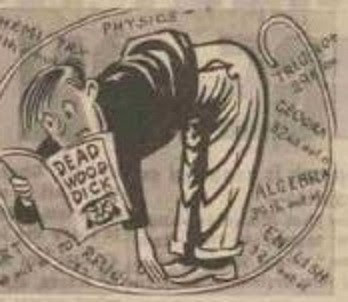Bad report is worst punishment, but teachers say keep the cane
A report in 1952 said some teachers may have caned pupils because they enjoyed it, but many more did it to save their careers: teachers who couldn’t produce results found themselves in trouble with the education authority.
A
bad report is the worst punishment .. but teachers say
KEEP
THE CANE
THE dread of facing Mum and Dad with a bad school
report is today a child’s worst punishment – far worse than touching his toes for six of the
best in the Head’s study.
But nine out of every ten teachers are against
abolishing corporal punishment in schools. This is revealed in a 120,000- word
report, published today, of a three-year survey by the National Foundation for
Educational Research in England and Wales on “rewards and punishment in
schools.”
Their verdict is that the total prohibition of
corporal punishment might lead to a small minority of unruly children causing
deterioration in the mental health of both pupils and teachers To parents the
report says bluntly: You are chiefly to blame if your children behave badly at
school To teachers it says: Pupils have a far sounder judgment than you on how
to make children work harder and better.
Thousands of children and hundreds of teachers and
education officials gave evidence for the survey, which was made after an M.P.
demanded total abolition of corporal punishment in schools.
This is what the survey discovered:
PUNISHMENTS
These are the punishments that 1,314 children from 94
secondary schools dislike most:
1 Unfavourable school reports because “they require
much ingenuity to explain away” at home.
2 Being barred from games or favourite lessons.
3 Being regarded as a pupil needing close watching by the
staff.
4 Being caned or strapped.
Teachers, 972 of them, decided the most effective
punishments were a talking to in private; extra work; being sent to the Head
for misbehaviour; being suspected of slacking and told to make a greater
effort; being given an unfavourable report for home; being deprived of games;
detention.
But 89 percent of the 724 teachers who gave evidence
on caning think it should be kept. Of the others, only 5½ per cent want it abolished and only 3½ per
cent think it should be made illegal.
Yet caning is decreasing, and younger teachers favour
it less. Assistant teachers, who have to “live” with the children are more in
favour of caning than the heads.
Classroom experiments carried out for the survey
showed that for caning to be effective teachers must have the parents’ backing.
The stick is used mostly on children openly defiant to teachers and is also
useful to combat destruction and cruelty to animals; but it is not very
successful as punishment for unpunctuality and absence, lying or lack of
concentration.
Ten times as many boys as girls are caned, yet most
headmistresses and nearly half the assistant mistresses want no “favouritism”
for girls. The report comments: “It is possible that some women teachers carry
a desire for equal treatment of the sexes into the field of punishment.”
Most teachers said girls should not be caned in the
presence of boys, that caning should be immediate and that caning or slapping
should not be abolished in infant schools.
Grammar-school sports masters would strongly oppose
difficult pupils being banned from games as a substitute for caning – “for their
teams may include more than an average proportion of difficult pupils.”
The report says some teachers may have caned pupils
because they enjoyed it, but many more have done it to save their careers:
teachers who can’t produce results find themselves in trouble with the
education authority. Both teachers and pupils have contempt for the teacher who
can’t keep order.
Girls dislike the cane much more than boys. But
neither sex worries much about a passing cuff from a teacher, and they don’t
take much notice of detention or being sent from the class-room for
misbehaviour.
Boys dislike being made to look foolish In class more
than girls, because “in our male-dominated society their normal self-esteem is
higher. They get more attention at home and their sisters, being accustomed to
more than a fair share of jocular ridicule at home, are less disturbed by it at
school.”
Heads will be shocked to find that children are left
cold by “a good talking-to in private.” Yet this is the most frequent
punishment that Heads use.
After studying thirteen schools where corporal
punishment was banned, the survey decided that essentials for success in those
schools were teachers convinced that they can control children without the
cane, special teaching methods for individual children, and close co-operation
between home and school.
Extracted from Daily
Mirror, 31 January 1952
Picture credit: Daily Mirror.








Comments
Post a Comment